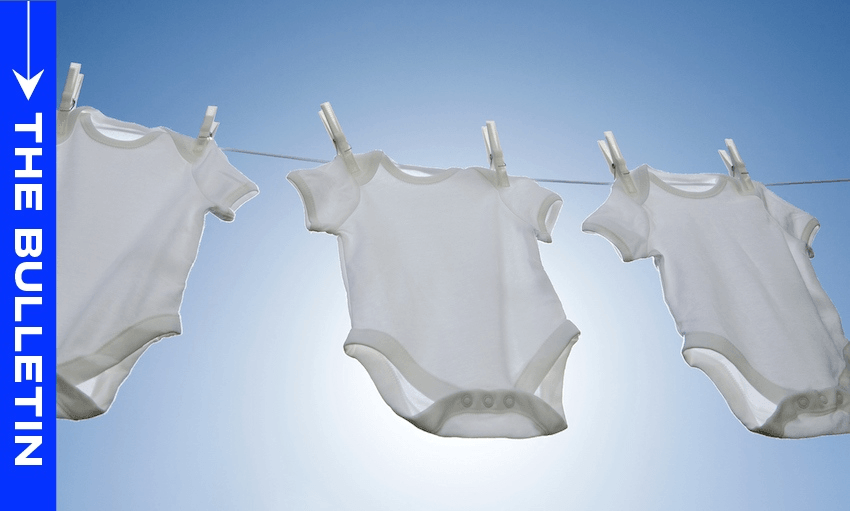The party announced a new campaign pledge this morning, with partners of a newborn’s primary carer entitled to four weeks paid leave by 2026. It would undoubtedly be meaningful for many but New Zealand would still lag on support offered to new families, writes Anna Rawhiti-Connell in this excerpt from The Bulletin, The Spinoff’s morning news round-up. To receive The Bulletin in full each weekday, sign up here.
Labour pledges to introduce paid partner leave for parents
Cast your mind back to the beginning of the month, before you’d read the word “boondoggle” more times than anyone should, and you will recall paid parental leave being a topic of discussion. Specifically, questions about why Labour voted down Nicola Willis’ shared leave bill which would have allowed spouses and partners to split the current paid parental leave allocation of 26 weeks. The move was described as petty politics by Willis. Law expert Claire Breen interrogated Labour’s decision at the time and judged it “a lost opportunity”. Breen hoped the conversation about sharing parental responsibilities would not stop and her wish has been granted. The probable answer for why Labour voted against Willis’ bill arrived this morning, with an announcement from Labour that if elected, the party will introduce four weeks of paid partner leave. The leave will be able to be taken concurrently or consecutively with the primary carer’s leave and is additional to the current entitlement of two weeks of unpaid leave. It will be phased in, starting with two weeks leave for partners from July 1, 2024, and increasing to four weeks by July 2026.
Policy would take us from bottom of OECD ranking
As the Herald’s Claire Trevett reports, the policy has been costed at $35m in the first year it is offered, rising to $70-$75m a year once the full four weeks is being paid. It would cost a total of $230m over the first four years and be paid for entirely by government. A number of employers in New Zealand currently top-up paid parental leave and also already offer paid partner leave but it’s been a perk and not a guarantee. The policy, according to OECD data from 2022, would catapult New Zealand up from the bottom of the list based on the number of weeks offered for secondary parents, to 5th equal. Just a note here — the terms fathers, mothers, paternity and maternity leave are used by the OECD, not me, and both National’s and Labour’s policies refer to parental leave and partners. For the sake of presenting the data, I’ve used the OECD’s splits which utilise those terms.
New Zealand ranked 22nd equal out of 43 countries based on pay
Based on the 26 weeks of paid parental leave (classified as maternity leave by OECD) currently offered, New Zealand ranks 7th equal in the OECD but that’s a bit deceptive when you look at the average payment rate. The OECD calculates the average pay rate as the proportion of earnings replaced by paid maternity leave over the length of the entitlement for a person earning 100% of average national full-time earnings. By that measure, New Zealand slides to 22nd equal out of 43 countries. Stephanie Pow, founder of Crayon, a startup focused on reducing financial stress for parents, suggests (paywalled) New Zealand has “some of the worst policies in the developed world for childhood and parenting.”
New Zealand really lags when full leave offerings taken into account
The OECD data also splits out maternity leave and other forms of parental leave like child care leave. Japan, for example, offers a year of paid childcare leave for both parents, although not at a full 100% pay rate. The country is looking to introduce a raft of measures that increase parental leave and childcare entitlements as it grapples with a declining population and low uptake of the current paid paternity leave offering. As Bridie Witton wrote following Christopher Luxon’s crack about New Zealanders needing to have more babies, this country’s birthrate has also hit record lows. “The factors which steer people’s family planning choices, such as extremely high housing costs, childcare costs, and the high cost of living, are not tipped in favour of childrearing,” she wrote. Here’s where we’d stand compared with other OECD and EU countries across all forms of partner leave including childcare leave based on average pay rates if Labour were to be elected.
As my father would say when we’d weigh up the merits of things, Labour’s election pledge is better than a poke in the eye with a sharp stick. For many, it will be far better than that, given we effectively start from zero unless you’re lucky to work somewhere that’s embraced the mutual benefits of making life easier for families. As Newsroom’s Jo Moir writes, revealing the announcement was brought forward, “Labour’s paid parental leave policy goes further than what Willis proposed, and it is good policy that will make a meaningful difference to parents.”


